#Robert Todd Lincoln
Text
Timeless re-rewatch - s1e02 (because I have no willpower)
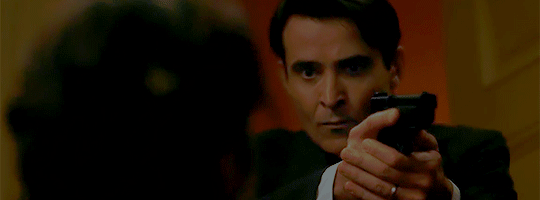
Th Assassination of Abraham Lincoln: so a lot of the US eras/events that Timeless visited, I didn't know much about, being a Brit. However, I did know a fair bit about Abraham Lincoln's end which helped in this ep.
As someone with a keen interest in historical fashion and an occasional costume maker, I love that we get to see Jiya helping Lucy into her 1860s undergarments 👍
Paperweights - you think Connor? 😆
I do love the Timeless intro with the date travelled to each ep featured. Simple but effective.
I like the plotline with Rufus (or Denzel Washington 😁) and the soldiers of colour.
First sighting of Karl, yay! Followed by the the world's worst Irish accent and the world's worst game of Operation 😆
Lucy goes tovthe train station and gets a date for the evening, but there's still more chemistry in the following scene with Flynn, even when they are yelling at each other 😁
Love that dress on Lucy, really want to make a cosplay of that one day 😍
I was unaware of the plot to kill Grant and Seward alongside Lincoln, so that was interesting to learn on first viewing.
The show is certainly not afraid of making Flynn the definitive bad guy at this point, making him kill Abraham Lincoln sermed a bold move! I love that Lucy managed to foil his attempts to change the timeline by killing , even though she's about half his size! The looks on both of their faces when he bursts in though 😱
"I wish I could have saved your father" "There was nothing you could have done" Guilt trip!
The paperweights seem to be working well 😁
I love the looks at the revised histories that they do in most eps and how members of the timeteam sometimes appear in them.
Double bombshell for Lucy at the end 😱😱 She deals with having a sudden fiance she's never met before way better than I would have done!
Starting to get bad vibes about Carol Preston there too 😒
#timeless re-rewatch#timeless#timeless s1e02#timeless - the assassination of abraham lincoln#lucy preston#rufus carlin#wyatt logan#garcia flynn#jiya marri#denise christopher#connor mason#carol preston#noah wyle#noah#abraham lincoln#robert todd lincoln#john wilkes booth#karl
6 notes
·
View notes
Text
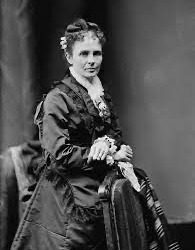
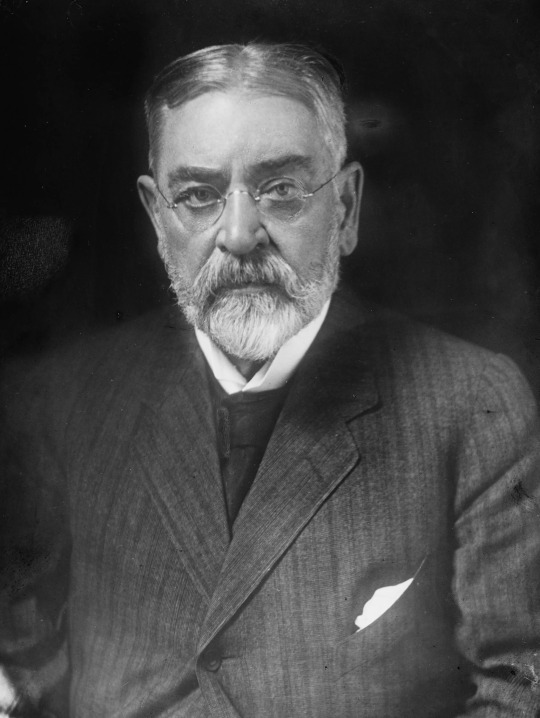
One was the wife of James Garfield. The other was the son of Abraham Lincoln. Choose.
2 notes
·
View notes
Text

@story-courty I can corroborate! Edwin Booth, elder brother of John Wilkes and the man considered possibly the greatest actor of the nineteenth century, saved Robert Todd Lincoln from falling from a train platform in Jersey City, New Jersey. We don't know the exact date of the incident, but it most likely occurred sometime in 1863 or 1864, when Robert was returning to Washington from Harvard, and Booth was going to Richmond with John T. Ford, owner of (believe it or not) Ford's Theater.
The Library of Congress website provides a link to the April 26, 1865 edition of the Cleveland Morning Leader that tells the story like this.
Not a month since, Mr. Edwin Booth was proceeding to Washington. At Trenton, there was a general scramble to reach the cars, which had started, leaving many behind in the refreshment saloon. Mr. Edwin Booth was preceded by a gentleman whose foot slipped as he was stepping upon the platform, and who would have fallen at once beneath the wheels had not Mr. Edwin Booth's arm sustained him. The gentleman remarked that he had had a narrow escape of his life, and was thankful to his preserver. It was Robert Lincoln, the son that that great, good man who now lies dead before our blistered eyes, and whose name we cannot mention without choking.
In some way the incident came to the knowledge of Lieutenant General Grant, who at once wrote a civil letter to Mr. Edwin Booth, and said that if he could serve him at any time he would be glad to do so. Mr. Booth replied, playfully, that when he (Grant) was in Richmond, he would like to play for him there.
Robert Lincoln confirmed the story for the Century Magazine in 1909. (Possibly as part of nationwide centennial celebrations of Abraham Lincoln's birth).
The incident occurred while a group of passengers were late at night purchasing their sleeping car places from the conductor who stood on the station platform at the entrance of the car. The platform was about the height of the car floor, and there was of course a narrow space between the platform and the car body. There was some crowding, and I happened to be pressed by it against the car body while waiting my turn. In this situation the train began to move, and by the motion I was twisted off my feet, and had dropped somewhat, with feet downward, into the open space, and was personally helpless, when my coat collar was vigorously seized and I was quickly pulled up and out to a secure footing on the platform. Upon turning to thank my rescuer I saw it was Edwin Booth, whose face was of course well known to me, and I expressed my gratitude to him, and in doing so, called him by name.
Edwin Booth didn't know the name of the man he'd saved until 1865, when Adam Badeau, another officer on Grant's staff who Lincoln had told the story to, wrote him a letter about it. Booth was a staunch Unionist and admirer of Abraham Lincoln, and he'd been feuding with his younger brother for years because of his Confederate sympathies. The news of the assassination devastated him, and he later told a friend that one of the only things that got him through those dark months afterward was the knowledge that he'd saved Robert's life. People initially thought that the Booth name was too blackened for Edwin to continue his career in acting, but he made a triumphant return to the stage in 1866 for a performance of Hamlet that got rave reviews, and eventually opened his own theater and went on a worldwide tour.
I can't fail to mention that this is only one of the coincidences regarding presidential assassinations in Robert Todd Lincoln's life, because he is the only man to have been present at events surrounding three of the four assassinations of American presidents. He was present at his father's deathbed after the assassination (though he wasn't at the theater and always regretted it, because he would have been sitting at the back of the box between Booth and his father). In 1881, he served as Secretary of War under President James Garfield, and was with him at the train station when he was shot by a crazed office-seeker. Robert secured the services of the doctor who had cared for Abraham Lincoln--though, unfortunately, this doctor's overzealous methods, insistence on his own theories, and refusal to follow antiseptic practices caused the infection that actually killed Garfield more than two months later. In 1901, Robert Lincoln was working as president of the Pullman Palace Car Company when President William McKinley invited him to the Pan-American Exposition in Buffalo, New York where McKinley was making an appearance. At the same time Lincoln's train pulled in to the station, McKinley was shot by an assassin who'd joined the receiving line to meet him. Lincoln immediately went to the hospital to visit the injured McKinley, who died six days later.
Robert Lincoln was a major figure in the Republican Party whose name was often mentioned as a presidential candidate, but Robert never pursued the office, for what should be obvious reasons.
This blog from the U.S. National Archives sums up the situation well.
When Theodore Roosevelt assumed the Presidency, Lincoln wrote him. “I do not congratulate you for I have seen too much of the seamy side of the Presidential Robe to think of it as a desirable garment.” Later, he was invited to the White House as a figurehead of the Republican Party. He declined and swore he would never step foot in the White House again. “I am not going and they’d better not invite me,” he said, “because there is a certain fatality about presidential functions when I am present.”
#answered asks#history is awesome#presidential talk#story-courty#i knew this story before i started my lincoln deep dive this year#though it hadn't shown up in any of my reading yet#the only place it was mentioned was in the lincoln assassination episode of 'timeless'#where robert todd is a character and is given an ironic line about how his family owes a great debt to the booths#i'm glad to have had the chance to do a little digging and confirm the details
32 notes
·
View notes
Text

@frxncaise said; “ why is he so tall? ”
╰► SOURCE: in-character quotes from discord

ALTHOUGH TAKEN ABACK BY the blunt question, Robert could not help but let out a loud laugh.
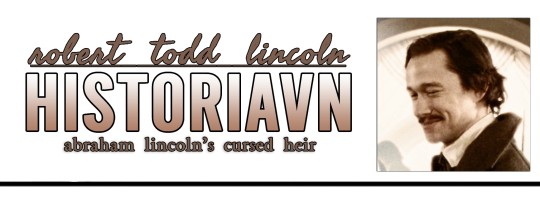
“I have no idea, but I wish that I knew. If there’s some sort of secret to it all, then Pa hasn’t told me.”

#✎ ; universe / timeline ── ❛ the prince of rails ❜ ── first son of the united states#╭ ⁞ ❏. narrations / robert todd lincoln.#╭ ⁞ ❏. written works.#╭ ⁞ ❏. askbox replies.#frxncaise
2 notes
·
View notes
Text
Antebellum Peeps ( TM ) As Dogs
some people and dogs were not included. include more at your leisure..
Albert Gallatin is a Labrador Retriever. He's smart, resourceful, basic, but he also gives very reasonable person vibes, even if he can feel a little boring at times. Still, that complete uninterestingness is what makes him special.
Samuel Howe is a Schnauzer. He's caring, social, protective of what he cares about for as long as he cares about it. I have never seen another dog that looks as much like a misogynist than schnauzers do. I like to think the ears and muzzle hair fit him.
William Lloyd Garrison is a Doberman. Proud, looks intimidating at first, and doesn't forget or forgive easily. Noble, just generally popular and well known. You can always depend on him to do what's right, even if it’s not exactly what you want him to do. This is Garrison as a dog breed, but also for him as a human being.
Floride Calhoun is a Chow Chow. High strung, bites strangers, and judges and ranks everyone based on their usefulness and importance to her. Fatalistic, cruel, probably some unresolved trauma as a natural consequence of being a Christian White Southern Woman in 1800s. Very Chow Chow behaviors.
Thomas Benton is a Rottweiler. Like a doberman, but more stocky, Benton is courageous, good-natured ( when he isn't faced with Clay, Calhoun, or Foote ), and confidently self assured. He's a stereotypical police dog, MANLY.
Andrew Jackson is a Canary Dog in behavior and a Greyhound in physique. He is large. He engages in dogfights. He looks fast, but is actually fairly chill and doesn't mind being lazy. He could rip someone apart. He WILL rip someone apart. He drools. He contains multitudes.
Benjamin Brown French is a Goldendoodle. Like a goldendoodle, French was created upon this Earth for one purpose. For a goldendoodle, that purpose was to remind mankind of their hubris. For French, it was to be the guiding voice of The Field of Blood. Both of them are lovable and funny unique abominations in the worst/best way.
Charles Sumner is an Akita. A very sleep deprived Akita with heart issues. Very strong, large, bear-like, and could probably take down a tank if he could. Like an Akita, though, Sumner is long-lasting and has thick skin! Metaphorically.
Harriet Martineau is a Papillon. Intelligrnt, petite, friendly, and has a much smaller stature than most of the other dogs on here, and despite not being American, is actually much more well-educated about American politics than actual Americans! She is also tiny but gives an air of great dignity and royal elegance as well a cuteness.
Julia Howe is a Wetterhoun. She's a water dog, with a natural talent, and despite being fairly reserved, gets along well with other people. She also has a strong will and won't back down from a challenge and is actually way more tolerant and patient than most people around her notice or give her credit for.
Daniel Webster is a Mastiff. Like a Mastiff, Webster is SCARY HUGE, has a reputation as being noble and almighty, and is the perfect fighting dog ( in terms of debate ). They both reportedly have the exact same mouth shape. He's also not easily provoked, similar to the Mastiff, and is pretty docile and domesticated when it really comes down to it.
Harriet Beecher Stowe is a German Shepherd. She's willing to learn, incredibly curious, smart and she's actually competant at what she sets out to do. Stowe, also like a german shepherd, is a very recognizable kind of figure, just like how german shepherds are recognizable dog breeds.
John Calhoun is a Border Collie. He, like a Border Collie, is terrifyingly smart. Calhoun is also adaptable ( to changes in political climate ) and great at herding ( his colleagues to secessionist ideals ), like a border collie.
Jefferson Davis is a Skye Terrier. Only ever had one person he actually loved ( his first wife ), and never moved on after her death. Like a Skye Terrier, gives off large amounts of old man energy. Had some pretty funky facial hair too once you stop and think about it. I also think it's funny how I'm assigning Davis a super tiny dog when in real life he was like Abraham Lincoln's hight.
John Quincy Adams is a Shiba Inu. BOLD and ridiculously PROUD and incredibly CLEAN and GRUMPY and INDEPENDENT and UNHAPPY and DIGNIFIED and ALOOF and THERE IS LITERALLY NO OTHER DOG THAT FITS JQA MORE.
William Seward is a Siberian Husky. Seward, similar to a Husky, is stubborn, clever, capable, and despite having great intentions, does tend to have some odd ideas at times. He’s extremely determined in his tasks, perhaps overly so. They're both also dogs that are instantly recognizable on sight, and have something to do with Alaska.
John Randolph is a Pug. He just is. His health issues are infinite. He looks hideous. He is tiny. He vibrates with rage at any given moment. Every noise that he makes only alienates him more. He is such a pug I genuinely can't imagine him as anything else, even before he contracted tuberculosis.
Rachel Donelson Jackson is a Bichon. She just wants to live her life, and move on, similar to a Bichon's passive nature. Chill, going with the flow. She and Bichons share the same vibes.
Nicholas Biddle is a Pomeranian. Tiny and extroverted and happy and friendly and lively and playful! Loves being in the center of attention like any other pomeranian. Both Biddle and Pomeranians have fantastic hair and are always alert about changes in their enviroment, and aren't afraid to challenge others. Often to their own detriment.
Mary Todd Lincoln is a West Highland White Terrier. Like a West Highland White Terrier, Mary Lincoln is tiny, and has a temper that can vary wildly depending on what's going on and who she's with. She hates being rough handled and is normally assured, stubborn and self-confident.
Louisa Adams is a Pitbull. Intelligent, trustworthy, kindhearted, and genuinely a good person even if it might not seem like that at first. She enjoys taking humorous situations literally, or at least with tongue in cheek, and if you wrong her she will not let it go. She's also a pretty medium-sized figure, both in society and as a dog.
Abraham Lincoln is a Great Dane. Because TALL politicians mean TALL dogs. Yet, despite being an imposing figure, he's genuinely friendly and is incredibly loving and devoted towards others, including strangers and especially children! He's just in general laidback, but make no mistake, can definately become dangerous if you provoke him.
Henry Clay is a Collie. His defining feature is that he's sensitive and keenly aware of other's emotions, as well as very goal-oriented and is terrified of any prospect of failure on his part. He can be " single-minded to the point of obsessiveness." And like a certain other collie on this list, Clay is also great at herding people towards desired politics.
Fanny Longfellow is a Golden Retriever. Gentle, smart, affectionate, adorable, and is incredibly tolerant of outsiders. Her friendliness is the stuff of legends, and she was incredibly popular and well known ( although not very much today ). She'll gladly pull others into her family, and she just gives really shiny Good Vibes.
Stephen Douglas is a Jack Russel Terrier. A bite that's ten times larger than his size and is very, very, fearlessly, active. If left bored or unhappy, Douglas will do great damage, like kickstarting Bloody Kansas. The Jack Russel Terrorist if left to his own devices.
Margaret Bayard Smith is a Cardigan Welsh Corgi. Loyal, devoted, and surprisingly responsible. She has hidden insecurities and despite what others might see as drawbacks, she has shown her effectiveness, intelligence, and presence time and time again.
Theodore Parker is a Chihuaha. He's a good guy and just wants to make sure that things turn out well for his friends and family. He's smaller than you might think he should be, but what he lacks in physical strength, he can easily make up for in bullets and words. He also needs serious modern medical intervention.
Martin Van Buren is a Pekingnese. Ridiculously fancy and small. Like a Pekingnese, also recognizably cold and determined, and tends to manipulate those around him, and tends to be stubborn and set in his ways. Yes, he truly does seem to make his own rules on how the world works, but he makes up for it by being a dandy.
Varina Davis is a Cocker Spaniel. Fancy and her hair is fantastic, gives very prestigious vibes about her. She is independent if needed, but still cares for others. Despite this, she still does have a vicious streak a mile wide.
Anna Maria Calhoun Clemson is an Australian Cattle Dog. A very intelligent herding dog, like her father, and closely resembles him. She can actually be pretty affectionate, but knows what she wants and definitely isn't afraid to nip people or bite to get there.
Adele Douglas is a Poodle, But specifically, she's of the medium-large variety. She's larger than Stephen Douglas that's for sure. She's intelligent, fancy, traditionally feminine, and is better than you in every way. She's loyal and greatly sociable and energetic. She's protective of her family, and loves them, even after they're dead.
Anne Royall is a Keeshond. She's relatively unknown, similar to a Keeshond, and can learn very quickly. She's a quick learner, intuitive, empathetic, and very persistant in what she believes in what's right, no matter what anyone else tries to tell her.
Lucretia Clay is a Newfoundland. She's calm, motherly, supportive, and a little larger than life. Doesn’t like crowds. She also has great athletic ability, which might or might not include swimming. Not sure about Newfoundlands’ business skills regarding her though.
Hugh Lawson White is an Afghan Hound. They're both dignified and aloof with a clownish streak and have also fantastic hair. White, like the Afghan Hound breed, is very old. Or at least, I always imagine him as being old.
Jessie Benton Fremont is an Alaskan Malamute. Big, smart, in charge, very influential. Prominent in her day, similar to an Alaskan Malamute and both her and the breed are distinguished and recognized today. Both of them also have something to do with a gold rush, one Californian, one Alaskan.
Susan B. Anthony is an Azawakh. She's independent and determined, as well as intuitive and understanding about what's going on around her. She's typically reserved, and while not aggressive, it does take some time and sensibility to get to know her. Fast, and both organize in groups to take down enemies.
Louisa May Alcott is a Greater Swiss Mountain Dog. Genuinely happy, enthused, collected, and satisfied with what she has. She's confident in nature and works well with children and her family members. Despite this, she's also vigilant, and can be outspoken and revolutionary if you pay attention. Inclusively, the four Greater Swiss Mountain Dogs all contain vaguely Alcott-like traits- a fitting parallel to Little Women.
Emily Tennessee Donelson is a Borzoi. She's calm, reliable, and tends to follow others' instructions, but she's also independent and can be rebellious at times. She doesn't need you or anyone, and quite frankly, she doesn't have many strong feelings about leaving if she doesn't feel respected. I realize I am painting a very weird picture of the Donelson-Jackson family here but just listen to me ok.
Robert Hayne is a Cavalier King Charles Spaniel. Adaptable, highly affectionate, playful, patient, eager to please, and both of them have a higher mortality than others. Both Hayne and the CKCS breed are both highly adorable and dandy-ish as well.
Margaret Eaton is a Basenji. She's friendly, a bit gossipy, though reserved with strangers. She cannot be trained and she and the Basenji both resemble pariahs in their lifetime. She has her own goals and wants and isn't afraid to try and reach them. Eaton also just in general feels like she'd be a sort of square, short-furred kind of dog, and I also think she doesn't like wet spaces.
Henry Longfellow is a Samoyed. He's optimistic and friendly and lovable and unique and I have an instant revulsion against using the same dog breed twice, otherwise, he'd be a Golden Retriever. The Samoyed's incredibly long and poofy white coat also resembles the long beard that Longfellow developes later on in life.
Sarah Polk is a Yorkshire Terrier. Fairly humble, but still elegant, important, and an air of prominence if she feels like it. She also isn't often taken seriously, despite her genuine great advice, but that's okay, because through god and girlbossification all this are possible.
Elizabeth Cady Stanton is a Schipperke. Determined, steadfast, sturdy, and like a Schipperke, is great at organizing and 'herding' people into organizing movements and the like. She's also a rarer kind of dog breed because the portraits taken of her look very prim and proper, which I'm pretty sure was all on purpose, but either ways, it still works.
Maud Howe is a Saluki. She is very freelancing, independent, and a rather creative person, all of which are incredibly similar vibes to a Saluki. She's shy, but despite this is also a socialite and interacts with others, playing a part and serving in various societies to help her community. She seems like a very special person, in the end, and really does deserve to be called a special breed of dog.
Sarah Goodridge is an English Setter. She's a gentlewoman by nature, intensely friendly, and she's very active and adores visitors, as well as being sensitive to criticism.
#the congressional incubator#henry clay#john c calhoun#daniel webster#charles sumner#andrew jackson#nicholas biddle#sarah polk#mary todd lincoln#julia howe#maud howe#abraham lincoln#lucretia clay#william lloyd garrison#samuel howe#theodore parker#margaret bayard smith#harriet martineau#benjamin brown french#stephen douglas#john quincy adams#robert haynes#william seward#thomas benton#floride calhoun#SOMANY PEOPLE
8 notes
·
View notes
Text
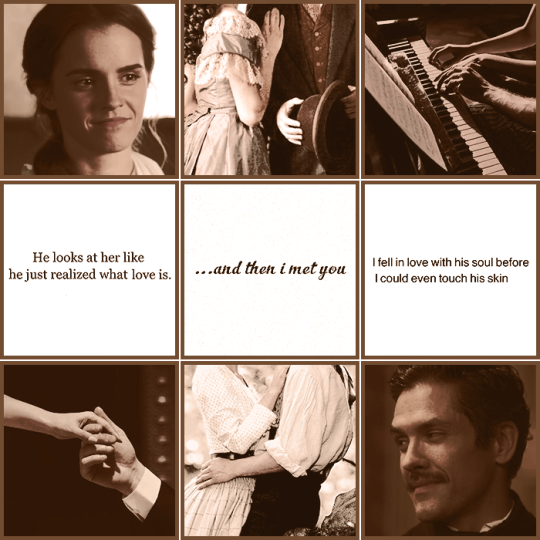
𝐘𝐨𝐮 𝐖𝐚𝐥𝐤𝐞𝐝 𝐈𝐧
𝐀𝐧𝐝 𝐌𝐲 𝐇𝐞𝐚𝐫𝐭 𝐖𝐞𝐧𝐭 𝑩𝑶𝑶𝑴

I had to make a moodboard for them, I had to, I love Hermione & Robert so much and I have Callie ( @historiavn ) to thank for it. So I had to make this bestie a wittle gift 🥺💕

#✦ 𝐂𝐔𝐏𝐈𝐃 𝐂𝐑𝐘𝐒𝐓𝐀𝐋𝐒 ➜ 「 Ship(s) Aesthetic / Musing 」#✦ 𝐒𝐇𝐈𝐏 ┋┋ ❛ YOU COULD CALL IT DESTINY‚ 'CAUSE I FOUND THE BEST OF ME IN YOU ❜ ➝ ⦗ Robert Todd Lincoln // historiavn ⦘#✦ 𝐁𝐋𝐔𝐄𝐁𝐄𝐋𝐋 𝐅𝐋𝐀𝐌𝐄𝐒 ➜ 「 Personal Art 」#⦗✦| also ship tag drop ♡ |✦⦘
2 notes
·
View notes
Text
A historical hunger games simulator (and me)
Jimmy Carter kills everyone.

Already he’s killed three people.

Czolgosz and I are hunting together, Robespierre almost killed Bernie, Breckenridge being creepy
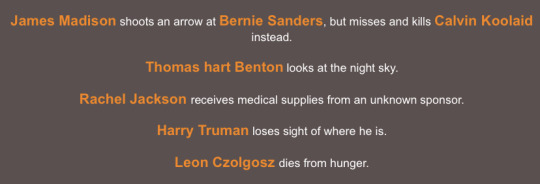
Dammit, Madison. Dammit Czolgosz. Also Coolidge auto corrected to Koolaid when I was making this…

Oh goodbye Hayne… also who is giving Breck a hatchet? OK Mary.

Carter kills another one. Weird as fuck alliances. Oh Clay.

Carter killed another one! And so does Jackson!
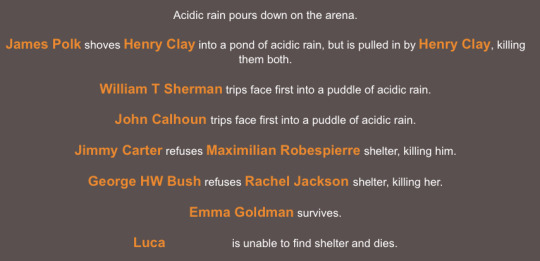
lots of people die. Including me.

What an anticlimactic death.

Honestly, she’s the best person to win this. I’m not mad.

Jim my Carter had six kills. SIX.
#Hunger games simulator#andrew jackson#james k polk#john c calhoun#henry clay#stephen douglas#maximilien robespierre#mary todd lincoln#abraham lincoln#william t sherman#jimmy carter#rachel jackson#robert hayne#thomas hart benton#leon czolgosz#emma goldman#charles sumner#james madison#bernie sanders#john c breckenridge#calvin coolidge#Koolaid#harry truman#george hw bush#and me lol
4 notes
·
View notes
Text

@historiavn said : ❛ you’ve been so quiet. what’s on your mind? ❜

the sound of his voice manages to successfully pull lucy from her thoughts. the better question might be what isn't on her mind. everything in her life has been a whirlwind of fear and uncertainty and stress since she'd been summoned to this small taskforce designed to prevent flynn from wreaking havoc on history. and now, because of something they had done, amy is gone.
they have a mission to focus on now, but her thoughts keep flitting back to her sister, and clearly, it hasn't gone unnoticed. it also isn't the only thing she's thinking about, but it's not as though she can tell him the truth on that score. so lucy offers up a shaky smile, shaking her head minutely. " nothing. " then, sensing that perhaps that won't be satisfactory enough, she adds softly, " my sister. " the word nearly catches in her throat. " she's ... away. sometimes it feels like i may never see her again. "
1 note
·
View note
Note
❛ i just want to be held for a little while. ❜
— Robert Todd Lincoln to Susan Pevensie
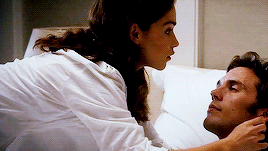
To kiss him, is to behold a summer's daydream, it gives her soul a spirited flight. Warm is Robert's skin beneath the pads of her fingertips as she prepares to bid him adieu for the night. It is his softly spoken request that brings the Gentle Queen to pause. She did so HATE to depart when STAYING was so very TEMPTING.
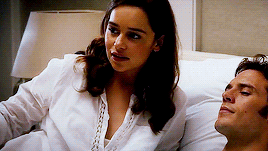
A smile appears upon her lips when she realized that no sensible person could fault her for delaying her departure. After all, with the storm raging, it was more judicious to hunker down. At least, for a few hours.
"Held? Hmmmm?" It manages to escape her perhaps a touch too eager. She reclines into a soft spot of his mattress and beckons Robert to follow suit. "You know, I am almost won champion cuddler of the year from my siblings."
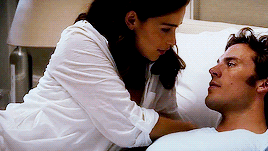
"Now, my darling Robert, just tell me where you want me and how you want to be held, and your wish will be fulfilled." Susan murmurs adoringly. And perhaps, a little while could turn into all night? If it did, she did NOT mind.
@historiavn
#historiavn#susan x robert todd lincoln#she wanted to use all three gifs XDDD so that's what you get#sorry if this doesn't make a lot of sense. working with a migraine#answered ask
1 note
·
View note
Text
The Elegant Mr. Arthur
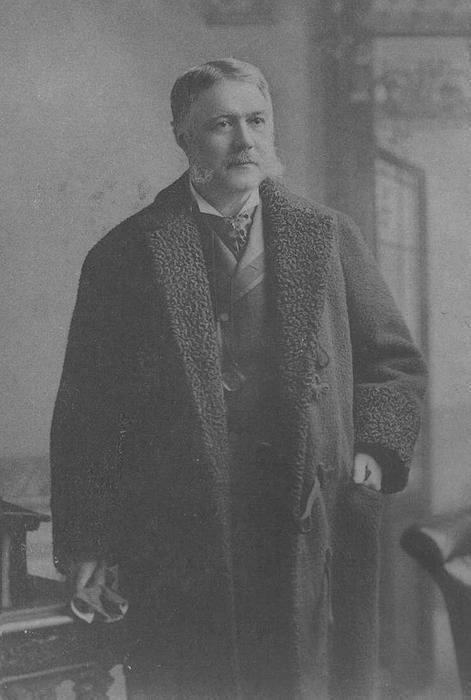
It was about two hours after midnight on September 20, 1881, and not unusual for the resident of 123 Lexington Avenue in New York City to be awake at such a late hour or to have plenty of guests. In fact, he preferred to keep late hours, entertaining friends deep into the night with late-night dinner, drinks, and endless conversation. Yet, on this night, 123 Lexington Avenue was somber and the mood was grave. Just a few hours earlier -- at 11:30 PM -- a messenger knocked on the door of Vice President Chester Alan Arthur's Manhattan brownstone and handed Arthur a telegram. Surrounded by a few friends and colleagues, Arthur read that President James Garfield, just 49 years old and in office for almost exactly 200 days, had died at a beach cottage rough 60 miles away, in Elberon, New Jersey. Turning to his friends in his sitting room, Arthur said, "I hope -- my God, I do hope it is a mistake."
On July 2nd, President Garfield was shot twice and seriously wounded by Charles Guiteau as he walked through the Baltimore & Potomac Railroad Station in Washington, D.C. with Secretary of State James G. Blaine and Secretary of War Robert Todd Lincoln (son of Abraham Lincoln), en route to a speaking engagement at his alma mater, Williams College in Massachusetts. Guiteau was a disgruntled, disturbed, and delusional office-seeker who had been pleading for an appointment as consul to Paris despite an absence of diplomatic or political experience and a complete lack of qualifications. Hounding Garfield throughout the early months of an Administration that had just begun on March 4, 1881, Guiteau's constant harassment of the new President finally resulted in Secretary Blaine ordering Guiteau to never return to the White House again. Guiteau felt that he had been entitled to some office, particularly a high-profile ambassadorship, and was terribly upset that Garfield and his Cabinet members refused to consider his requests. Blaine's order to stay away drove Guiteau to purchase an ivory-handled .44 British Bulldog revolver (specifically chosen because Guiteau felt that particular firearm would look good in a museum) and he began stalking Garfield throughout Washington before finally shooting him in the rail station two days before Independence Day 1881. As police arrested him, Guiteau shouted, "I am a Stalwart of the Stalwarts...Arthur is President now!"
But, Arthur wasn't President; not yet at least. Garfield was a physically robust man and relatively young in comparison to most Presidents. Although one bullet had lodged in Garfield's spine, the other bullet grazed his arm and caused no significant damage. While it appeared that he was gravely immediately following the shooting, Garfield's vital signs soon started to improve and the American people began to get their hopes up about a full recovery. A vigil of sorts was underway as President Garfield convalesced in the White House, and his doctors issued regular bulletins updating his condition. Garfield's doctors also poked and prodded with unsterilized instruments and dirty fingers to attempt to locate the bullet still inside of the President's body. Had they left it alone, Garfield almost certainly would have survived; his wounds were significantly less dangerous than those survived by Ronald Reagan 100 years later. However, the unnecessary poking and prodding resulted in a serious infection that ravaged Garfield's body, weakened his heart, and left the muscular, 215-pound President emaciated and weighing less than 135 pounds. After fighting for his life in the sweltering summer heat of Washington, on September 6th it was finally decided to transport Garfield to a cottage on the Jersey Shore in hopes that he could benefit from the fresh ocean air. Sadly, it was too late. The infections were accompanied by blood poisoning and pneumonia, among other ailments. On September 19th, at 10:35 PM, Garfield suffered a massive heart attack and was pronounced dead. In the 79 days since he had been shot, Garfield had lost over 80 pounds and the 49-year-old President's dark brown hair and beard had turned a ghastly white color. An hour later, the messenger arrived at 123 Lexington Avenue.
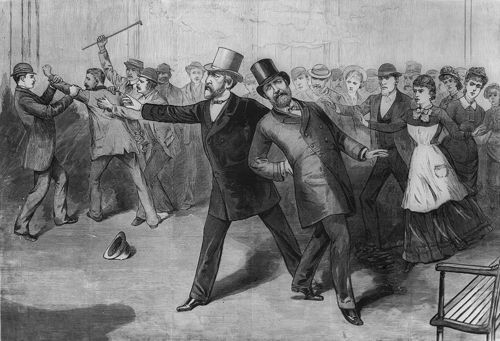
•••
The Vice Presidency was a stretch. Chet Arthur of New York as Vice President? When offered the Republican Vice Presidential nomination by James Garfield in 1880, Chester Arthur was urged by his political mentor, the leader of the Stalwart branch of the Republican Party, Senator Roscoe Conkling of New York, to decline the appointment. Arthur, a man who had never spent a day in Congress or been elected to any office at any level, couldn't turn down such an unexpected opportunity. He accepted the nomination and was elected alongside Garfield in November 1880, but most of the country (rightfully) saw Arthur as the poster boy for a machine politician elevated by the spoils system. The Vice Presidency was certainly a stretch for Chester Arthur, but President of the United States? That was an almost frightening thought to a nation still recovering from Civil War and desperately seeking civil service reform, especially now that a disgruntled office-seeker has assassinated the President. The idea of Arthur as President left a lot of Americans worried -- some because Arthur's political background was as the powerful and somewhat shady Collector of the Port of New York, appointed during the controversial Administration of President Ulysses S. Grant and eventually fired by President Rutherford B. Hayes during a housecleaning of corrupt institutions; and some because James Garfield's murderer had claimed to be a Stalwart and, by his own words, insinuated that Garfield's shooting might be a conspiracy on behalf of Arthur's faction of the divided Republican Party.
Chester Arthur was a creature of the era known as the "Gilded Age" and was the symbolic mascot for the widespread corruption of the 1870's due to his position at the Port of New York. Born in Vermont in 1829, Arthur was the son of a preacher and grew up mostly in upstate New York, graduated from Schenectady's Union College in 1848, briefly taught school was studying law, and was admitted to the bar in 1854. As his law practice grew in the 1850's, Arthur immersed himself in New York Republican politics yet never ran for office. A political appointee to the New York State Militia, he found himself serving during the Civil War and his superb organizational skills led to quick promotions all the way to quartermaster general in 1862, a position which carried the rank of brigadier. As a political appointee to the militia, however, Arthur served at the pleasure of the Governor of New York and was forced to resign in 1862 when a Democratic Governor took office. Returning to New York City, Arthur resumed his law practice and political gamesmanship. More appointments came his way as he supported Republican candidates throughout the state and worked on national campaigns such as President Lincoln's 1864 bid for re-election and Ulysses S. Grant's 1868 Presidential campaign.
In 1871, President Grant appointed Arthur as Collector of customs at the Port of New York, which gave Arthur responsibility for about 75% of the nation's customs duties and was one of the most powerful patronage positions available in the United States government. Arthur used his office to efficiently raise money for Republican campaigns and candidates, supporting President Grant's 1872 re-election campaign by seeking contributions from his employees at the customhouse. In 1876, Arthur championed his political mentor, Roscoe Conkling, for the Republican Presidential nomination, but supported Rutherford B. Hayes in the general election, once again using the employees at the customhouse to help raise money to finance the successful Republican campaign. However, once Hayes was elected, the new President made it clear that he was serious about civil service reform and that meant reforming Arthur's customhouse, too. In 1877, Arthur testified before the Jay Commission, which was formed to investigate charges of corruption and eventually recommended that President Hayes reduce the workforce of the customhouse and eliminate the corrupt elements that had worked there for so long. Due to Arthur's longtime support of the Republican Party, President Hayes offered him an appointment as consul in Paris in order to quietly remove him from the Port of New York. When Arthur refused the appointment, the President fired him and Arthur resumed his law practice in New York City (Hayes intended to replace Arthur with Theodore Roosevelt, Sr. -- father of the future President -- but Conkling felt insulted by Hayes's termination of Arthur and worked to kill Roosevelt's appointment during his Senate confirmation ).
When Arthur headed to the 1880 Republican National Convention at the Interstate Exposition Building in Chicago, it was as a New York delegate supporting the aspirations of former President Ulysses S. Grant who was coming out of retirement to seek an unprecedented third term. However, neither of the front-runners for the nomination -- Grant and Senator James G. Blaine of Maine -- could capture enough votes from delegates to clinch the nomination. After thirty-five ballots, Blaine and another prospective candidate, John Sherman of Ohio, threw their support behind a dark horse candidate -- Ohio Congressman James A. Garfield. On the next ballot, Garfield clinched the nomination and reached out to the opposing wing of the Republican Party for his Vice Presidential choice. The first choice, Levi P. Morton of New York (who would later serve as President Benjamin Harrison's Vice President) declined Garfield's offer, and Arthur -- who had never previously held an elective office -- excitedly accepted, much to the chagrin of his angry political mentor, Roscoe Conkling. Not confident in Garfield's chances for election, Conkling told Arthur, "You should drop it as you would a red hot shot from the forge." Arthur replied, "There is something else to be said," and Conkling asked in disbelief, "What, sir, you think of accepting?" Despite the complaints and anger of Conkling, Arthur told him, "The office of Vice President is a greater honor than I have ever dreamed of attaining. I shall accept. In a calmer moment you will look at this differently."
Following the election, Arthur prepared to settle into the quiet role of Vice President during the 19th Century. The Vice President of the United States has only one real Constitutional responsibility -- to preside over the Senate, and even that responsibility is normally delegated to Senators who rotate as presiding officer almost daily. The powerful or even influential American Vice Presidency is a fairly recent evolution, not even 50 years old. While some Vice Presidents were relied upon for advice or counsel or given larger duties than others, most Vice Presidents were so far removed from the Executive Branch that they were not only kept out of the decision-making process but also kept in the dark about certain information. For example, when President Franklin D. Roosevelt died towards the end of World War II in April 1945 and was succeeded by his Vice President, Harry S. Truman, the new President Truman had to be quickly briefed about the existence of the Manhattan Project to develop atomic weaponry. The first Vice President to have an office in the White House was Walter Mondale and that didn't occur until 1977, so in 1881, a Vice President was expected to preside over the Senate on special occasions, cast a tie-breaking vote when necessary, and be available to take the oath of office if the President happened to die or resign.
Like most 19th Century Vice Presidents, Chester Arthur didn't even spend much time in Washington, and he was returning to his regular home in New York City on July 2, 1881 when he stepped off a steamship with Roscoe Conkling and was told that President Garfield had been shot. In fact, the first message that Arthur received erroneously reported that Garfield was already dead and at the request of Garfield's Cabinet, the stunned Vice President immediately returned to Washington, D.C. to proceed with the next steps necessary for maintaining the continuity of government. When Arthur arrived in Washington, President Garfield's condition had improved and his recovery continued to show signs of promise as the Vice President and the nation prayed for him and held vigil throughout the summer. Shaken by rumors that he and his "Stalwart" wing of the Republican Party conspired to assassinate Garfield, Arthur returned home to New York City, hesitant to invite criticism that his continued presence in Washington was merely an eager deathwatch so that he could grab power.
Garfield clung to life for eighty excruciating days with doctors probing him in an effort to remove the bullet in his body, causing infections and leaving the President suffering from blood poisoning which led him to hallucinate at times. The Navy helped rig together an early form of air conditioning in Garfield's White House sickroom in order to give him relief from Washington's stifling summer conditions. When Garfield was taken by train to New Jersey in early-September, it was clear to many that the long vigil was nearly over. More infections set in, along with pneumonia and painful spasms of angina. When the messenger arrived at 123 Lexington Avenue just before midnight on September 20, 1881 to inform Arthur that President Garfield had died just 60 miles away, the new President wasn't surprised, but he also wasn't quite prepared. The nation worried about the lifetime political operative stepping into the position vacated by the promising President assassinated before he could enact the civil service reforms promised in his Inaugural Address. What would Arthur -- the quintessential patronage politician -- do as President? Nobody knew, but Chester Alan Arthur had an idea.
•••
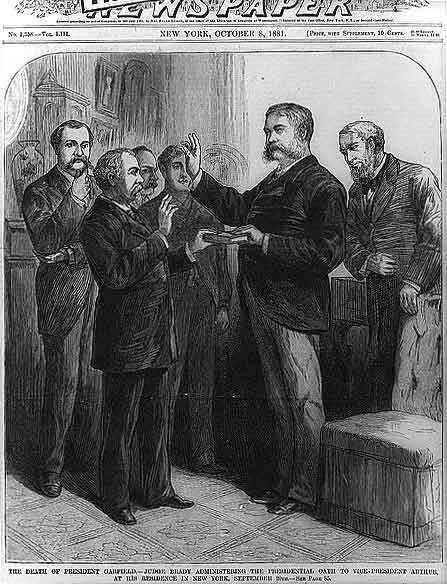
It was fitting that Arthur was surrounded by friends when he took the oath of office at his home in Manhattan at 2:15 AM on September 20, 1881. Arthur's beautiful wife, Nell, died of pneumonia in January 1880 and he was inconsolable for months, regretting for the rest of the life the fact that she never saw his election as Vice President or ascendancy to the Presidency. People who knew Arthur stated that he clearly never fully recovered from her death, and that as a "deeply emotional...romantic person," it was no surprise that he ordered that fresh flowers were placed before her portrait in the White House every day while he was President.
Chester Arthur had a lot of friends. That's what happens when you control as many patronage positions as Arthur controlled for as long as Arthur controlled them. But it wasn't just his political position that gained him friends. Arthur was a great storyteller, a man who loved to hunt and fish, kind, easy-going, charming, graceful, and smooth. During his life he was nicknamed "Elegant Arthur" and is considered one of the most stylish of Presidents. Photographs of Presidents from the 19th Century show us men no different than statues. They dressed the same, they looked the same, and when portrayed in the black and white photos of the time, we feel no differently when we see their pictures than when we see a slab of marble carved in their image. Arthur leaps out of his photographs, however. He was a very large man for his era, standing 6'2" and weighing around 220 pounds during his Presidency. Large muttonchops connected to a bushy mustache and his close-cropped, wavy brown hair seemed to pull back his forehead and place more emphasis on expressive black eyes that easily reflected his moods. While it seems that most Presidents of the 19th Century wore the same boring black suit and black tie like a uniform, Arthur's ties are patterned, his jewelry is visible, collars are crisp, handkerchiefs are folded creatively, and his lapels shine as if they were polished along with his shoes. We see photographs of Arthur in fashionable overcoats, a wide variety of hats, and he employed a personal valet who helped the President change clothes for every occasion and multiple times a day -- he was said to have over 80 pairs of pants.
Most apparent of all is that Arthur was a gentleman -- an interesting man with superb social skills and fastidious manners. Even as one of the top operatives in New York's Republican political machine of the corrupt 1870's, he was nicknamed the "Gentleman Boss." As President, he brought entertainment back to the White House -- something that had been missing on a large scale since before the Civil War twenty years earlier. One of his recent predecessors, Rutherford B. Hayes, was one of the few critics of this development, stating that there was "nothing like it before in the Executive Mansion -- liquor, snobbery, and worse." Arthur also redecorated the White House, hiring Louis Comfort Tiffany to help with the design. To help raise money for the redecoration, Arthur basically held a White House yard sale. On the lawn of the mansion, twenty-four wagons full of history (including a pair of Abraham Lincoln's pants that were left behind in a closet) were sold to citizens. To some, the items were priceless; to President Arthur, they were ugly and a man like Chester Arthur did not live in an ugly home. Several weeks after Garfield died, Arthur got his first look at his new home and quickly stated, "I will not live in a house like this." He didn't end up moving into the White House until three months into his Presidency.
•••
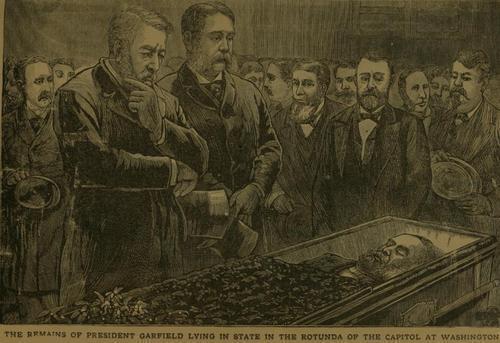
After taking the oath of office at home in Manhattan in the early hours of September 20, 1881, now-President Arthur proceeded to Washington, D.C., stopping in Long Branch, New Jersey to pay respects to the late President Garfield and his grieving family. Once Arthur succeeded to the Presidency upon Garfield's death, there was no Vice President, no president pro tempore of the Senate, and no Speaker of the House because Congress had not elected its leadership yet, thus, there was no Constitutional line of succession. If something had happened to Arthur at that moment, the United States would have faced an unprecedented Constitutional crisis. As his first act as President, Arthur immediately called the Senate into session in order to select their leadership positions and place someone in the line of succession. Upon arriving in Washington, Attorney General Wayne MacVeagh suggested that Arthur take a second oath of office and he did so at the U.S. Capitol on September 22nd in the presence of Garfield's Cabinet, members of Congress, Supreme Court Justices, and former Presidents Grant and Hayes.
Americans worried about the former machine politician's integrity were transformed quickly as Chester Arthur underwent somewhat of a transformation himself. Widely considered a lapdog of New York's Roscoe Conkling, Arthur broke ranks with the party boss and pushed for the same civil service reform championed by James Garfield prior to the assassination. Arthur's former associates in the New York Republican Party were disappointed when he declined their requests for political favors. One former colleague sadly reported, "He isn't 'Chet' Arthur anymore. He's the President." Arthur found that the transformation was almost automatic and out of his control, noting that "Since I came here I have learned that Chester A. Arthur is one man and the President of the United States is another." His old benefactor, Conkling, was one critic of the new President, complaining "I have but one annoyance with the Administration of President Arthur and that is, in contrast with it, the Administration of Hayes becomes respectable, if not heroic." Arthur signed the Pendleton Act in 1883 which created a modern civil service system and eliminated the spoils system that had long dominated American politics. The reform, which Conkling called "snivel service" was the final break between the longtime friends and colleagues.
To the American people, the great surprise of the Arthur Administration was the fact that it was clean, honest, and efficient. Arthur helped lift the gloomy moods that had shadowed Washington through the Civil War, Lincoln's assassination, Andrew Johnson's Impeachment, Reconstruction, the corruption of the Gilded Age, and Garfield's assassination. His popularity rose throughout his term and most critics focused on his lavish entertainment or the fact that he was notoriously late for meetings and seemed bored or lethargic at times. He often procrastinated -- as a White House clerk once said, "President Arthur never did today what he could put off until tomorrow." Still, most Americans were happy with President Arthur and echoed the thoughts of Mark Twain who said, "I am but one in 55 million; still, in the opinion of those one-fifty-five-millionth of the country's population, it would be hard to better President Arthur's Administration."
He was bored, though. President Arthur didn't like being President. He enjoyed the entertaining dinners that he could throw and loved public events or ceremonies that allowed him to meet the people of the United States, but the desk work was tedious and he wasn't interested in policy. Arthur stayed up late and seemed to vacation often, which perplexed many people because it was said that he was constantly exhausted. What they didn't know was that from almost the time he became President, Chester Arthur was dying. In 1882, he was diagnosed with Bright's disease, a fatal kidney ailment at the time. Despite reports that he was suffering from the disease, Arthur hid it from the public, desperately protecting his privacy, as always. Arthur's distaste for the Presidency probably stemmed in part from depression triggered by the Bright's disease. At times, Arthur suffered from debilitating illness and it was always covered with a story about the President catching a cold during a fishing trip or spending too much time in the sun while hunting. In a letter to his son Alan in 1883, the President confided, "I have been so ill that I have hardly been able to dispose of the...business before me."
Despite his popularity, Republican leaders opposed Arthur's nomination as President in his own right in 1884. The man who opposed it most, however, was the President himself, who stated "I do not want to be re-elected." Not only was he disinterested in a second term, but he knew very well that there was a possibility he might not even survive to the end of his current term. He did, and after attending the inauguration of his successor, Grover Cleveland, on March 4, 1885, Arthur returned home to New York City where his health rapidly declined. The former President was aware that he was dying and made plans for a relatively quiet retirement, deciding to practice law, but doing very little work due to his health. When asked about his future, Arthur said, "There doesn't seem anything for an ex-President to do but to go out in the country and raise big pumpkins." On November 16, 1886, Arthur suffered a stroke that paralyzed his left side. Gravely ill, he called his son to his bedside the day before his death and had all of his public and private papers stuffed into trash cans and burned. On November 18, 1886, the 57-year-old former President died in the same place he became President just five years earlier, 123 Lexington Avenue in New York City. After a quiet funeral at the Church of Heavenly Rest on Fifth Avenue in New York, Arthur's remains were buried next to his beloved wife at Rural Cemetery in Albany, New York.
•••
When President Arthur had many of his personal papers burned prior to his death, he eliminated one of the best sources of information for future historians. With a thin resume and a fairly uneventful Presidency, there wasn't much public information about his career, either. This leaves us with very little to remember Chester Alan Arthur by. Research on his life -- particularly his personal life -- is difficult, and Arthur would have appreciated that. During his Presidency, leaders of the temperance movement called on Arthur and urged him to follow the non-alcoholic lifestyle led by President Hayes and his teetotaler wife, who was known as "Lemonade Lucy."
Arthur's response: "Madam, I may be President of the United States, but my private life is nobody's damn business."
And so it isn't.
#History#Presidents#Chester Arthur#Chester A. Arthur#Chester Alan Arthur#President Arthur#Arthur Administration#Presidential History#The Elegant Mr. Arthur#James A. Garfield#President Garfield#Assassination of James Garfield#Garfield Assassination#Charles Guiteau#Inauguration of Chester Arthur#Presidential Assassinations#Presidential Succession#Roscoe Conkling#Gilded Age#Civil Service Reform#Pendleton Act#1880 Election#1884 Election#Politics#Political History#Gentleman Boss#Presidential Personalities#Presidency#Vice Presidents#Vice President Arthur
26 notes
·
View notes
Text
Robert Todd Lincoln, Abraham Lincoln’s oldest son, was Garfield’s Secretary of War. He saw Guiteau shoot Garfield and was therefore one of the few men closely associated with the first two assassinations of U.S. presidents. Twenty years later, Lincoln was attending the Pan-American Exposition in Buffalo, New York when Leon Czolgosz assassinated President William McKinley in September 1901.
Via https://danieldrezner.substack.com/p/the-21st-century-destiny-of-the-republic
30 notes
·
View notes
Text
List 5 topics you could talk about for an hour without preparing any material.
With Malice Toward None: a Musical of Abraham Lincoln and the Civil War. I’ve been developing this musical since summer 2020. With Malice Toward None focuses on exploring the mental health struggles that Lincoln experienced during his presidency. The musical is narrated by Robert Todd Lincoln, who recalls the storyline’s events with complete omniscience while at the 1922 Lincoln Memorial dedication. Relevant themes for the show include mental health, public history, teams that become brotherhoods, compassion, the stages of grief, leadership, and a bunch of other concepts that I’ll probably end up yapping about on here at some point. Orchestrally, the show can be described as “if Les Misérables, Hello Dolly, and Evita decided to have a threesome in my brain”.
all of my original characters. seriously. I have SO MANY OF THEM that I’ve developed over the years, mostly for historical fiction. 😭 the ones that are living rent free in my head the most right now are Anastasia Andrews-Ismay (the human personification of the Titanic), Lieutenant General Ethan Clay, and Dr. Constance Pierpont Morgan. Honorable mention goes to my Star Wars OC Shi’al Valorum 💅 if any of these muses seem familiar to you then we’ve probably either been in a discord server together or you’ve somehow stumbled across one of my roleplay blogs.
the rms titanic. literally EVERYTHING about this ship and her sinking is my Roman Empire. I’m particularly fond of yapping about Captain Smith, Thomas Andrews, Wallace Hartley, William Pirrie, J.P. Morgan, or any of the officers — but if you get me talking about the vilification of Bruce Ismay by the sensationalist yellow press in the aftermath of the sinking, then I WILL NEVER SHUT UP.
star wars. my first exposure to the Star Wars franchise was when I was a sophomore in high school and I got to see a screening of A New Hope where the soundtrack was played by a live orchestra. suffice to say, this altered my brain chemistry and I’ve never been the same since. I’m a Prequels girlie and Jedi apologist to my CORE; my favorite characters are probably Yoda, Dooku, Mace Windu, and Bail Organa.
film and tv soundtracks. …the fact that I once did a TWENTY FIVE MINUTE LONG presentation on the film score for Titanic (1997) should tell you everything that you need to know about this silly fixation of mine.
HONORABLE MENTIONS: ghost hunting, tarot cards, classical music, Taylor Swift, creative liberties taken by Lin Manuel Miranda for Hamilton, historical fiction as a genre in an era where media literacy is on the decline, Antebellum America, the Great Triumvirate (Henry Clay, John Calhoun, Daniel Webster), the Lost Cause of the Confederacy, and public history.
TAGGED BY no one. I stole it from the for you tab LOL
TAGGING: @viellohi, @the-rmstitanic, @man-i-dunno, @allysah, @charmwasjess, @quicksiluers, @aceofthyme, @tipsywench, @macaron-n-cheese, @meerawrites, @elisabeth515, @its-rmstitanic, @mattaytchtaylor, @tommy-288, @chamberlainswifey, AND YOU.
* make a separate post. do not reblog.
#I’m going to start doing dash games on here and I figured this would be a perfect one to get us started 💅#dash games
22 notes
·
View notes
Quote
Robert Todd Lincoln, Abraham Lincoln’s oldest son, was Garfield’s Secretary of War. He saw Guiteau shoot Garfield and was therefore one of the few men closely associated with the first two assassinations of U.S. presidents. Twenty years later, Lincoln was attending the Pan-American Exposition in Buffalo, New York when Leon Czolgosz assassinated President William McKinley in September 1901.
The 21st Century Destiny of the Republic
21 notes
·
View notes
Text
lista de nomes masculinos que estava no meu bloco de notas e eu só lembrei agora
starting with A ;;
aaron.
adair.
adam.
aiden.
ajax.
alec.
alfie.
allistar.
anderson.
andrew.
andy.
angus.
antonio.
anthony.
archer.
archibald.
archie.
aries.
arlo.
arthur.
ashley.
ashton.
austen.
avery.
axel.
starting with B ;;
bailey.
beau.
beckham.
beckett.
bellamy.
benjamin.
bennett.
bentley.
blade.
blake.
blaine.
blaise.
blue.
bobbie.
bodhi.
brad.
brandon.
braxton.
brayden.
brent.
brett.
brock.
brody.
brooke.
bryson.
starting with C ;;
caleb.
callum.
calvin.
cameron.
carlisle.
carlos.
carson.
carter.
casey.
chad.
chandler.
charlie.
chase.
chaz.
christian.
christopher.
cody.
colby.
cole.
cooper.
colton.
connor.
conrad.
corbin.
corey.
starting with D ;;
dakota.
dallas.
damien.
damon.
dante.
darian.
darron.
darryl.
david.
dawson.
declan.
demetri.
dennison.
denver.
derek.
diego.
diesel.
dimitri.
dixon.
dominic.
donovan.
drake.
drew.
dustin.
dwayne.
starting with E ;;
eason.
eaton.
eddy.
edmund.
edward.
elijah.
elior.
ellias.
elliot.
ellis.
elyas.
ember.
emerson.
emery.
emilio.
emmett.
enzo.
eric.
ernie.
ethan.
ethaniel.
evan.
everett.
everson.
ezar.
starting with F ;;
fabio.
fallon.
farah.
felix.
fernando.
ferris.
felton.
finn.
finnegan.
finnick.
fitz.
fitzgerald.
fletcher.
floyd.
flynn.
foley.
forest.
francisco.
franco.
frankie.
franklin.
fraser.
frasier.
freddie.
fredrik.
starting with G ;;
gabe.
gabriel.
gale.
gallagher.
garcia.
gareth.
garrett.
gary.
gavin.
gene.
george.
gerard.
gilbert.
giovanni.
glenn.
gordon.
grady.
graeme.
grant.
greggory.
gregor.
greyson.
griffin.
gus.
guy.
starting with H ;;
hadley.
hale.
haley.
hamilton.
hamish.
hansel.
harley.
harris.
harrison.
harry.
harvey.
haven.
hayes.
heath.
hector.
hendrix.
henrik.
henry.
holton.
howard.
hudson.
hugh.
hugo.
hunter.
hyde.
starting with I ;;
ian.
ibrahim.
icarius.
idris.
igor.
iman.
immanuel.
imran.
indi.
indiana.
indigo.
indra.
inrique.
irwin.
isaak.
isaiah.
isaias.
ishmael.
isobell.
israel.
ivan.
ivey.
ivor.
ivory.
izzy.
starting with J ;;
jack.
jacob.
jagger.
jai.
james.
jamie.
jason.
jaspar.
jaxon.
jaydon.
jed.
jeremy.
jesse.
jett.
joel.
jameson.
jonathon.
jordan.
jose.
joseph.
joshua.
jude.
julian.
junior.
justin.
starting with K ;;
kade.
kai.
kalen.
kameron.
kane.
kasey.
kayden.
keaton.
keegan.
keenan.
kellan.
kendall.
kendrick.
kevin.
khalil.
kian.
kiefer.
kieran.
kingsley.
kingston.
klaus.
kohen.
konrad.
kristoff.
kyle.
starting with L ;;
lachlan.
lamar.
lambert.
lance.
landon.
langston.
lawrence.
lawson.
leeroy.
lennon.
leo.
leonardo.
levi.
lewis.
liam.
lincoln.
lionel.
logan.
lorenzo.
louis.
luca.
lucas.
lucky.
lucis.
luke.
starting with M ;;
mackenzie.
madden.
maddox.
malaki.
malcolm.
manuel.
marco.
marcus.
marley.
marshall.
martin.
mason.
matteo.
matthew.
max.
micah.
michael.
miguel.
mike.
miles.
miller.
milo.
mitchell.
morgan.
moses
starting with N ;;
nadir.
naiser.
nasir.
nate.
nathan.
nathaniel.
naveen.
naydon.
ned.
nico.
neil.
nelson.
nero.
nicholai.
nicholas.
nila.
niles.
nixon.
noah.
noel.
nolan.
norman.
north.
nylan.
nyle.
starting with O ;;
oakley.
ocean.
octavius.
odell.
olaf.
oliver.
ollie.
omar.
omari.
orion.
orlando.
osborn.
oscar.
o’shea.
osten.
oswald.
otis.
otto.
owen.
oxley.
starting with P ;;
pablo.
page.
palmer.
parker.
parrish.
patrick.
paul.
paulo.
pax.
paxton.
payton.
penn.
percy.
perry.
peter.
phineas.
phoenix.
pierce.
pierre.
prescott.
presley.
preston.
prince.
princeton.
puck.
starting with Q ;;
qadim.
qadir.
quain.
quenby.
quill.
quimby.
quincy.
quinn.
quinten.
starting with R ;;
randy.
raymond.
reese.
reid.
remy.
reuben.
rhett.
rhys.
richard.
richie.
ricky.
riley.
robert.
robin.
roger.
roman.
romeo.
ronan.
ronnie.
ross.
rowen.
ryan.
ryder.
ryker.
rylan.
starting with S ;;
sage.
sailor.
salem.
samson.
samuel.
sascha.
sawyer.
saxon.
scott.
sean.
sebastian.
seth.
shane.
shiloh.
simon.
sinclair.
skyler.
sonny.
spencer.
stanley.
stefan.
steven.
stevie.
storm.
sullivan.
starting with T ;;
tamir.
tanner.
tate/tait.
tatum.
taylor.
teddy.
theo.
thomas.
timothy.
tobias.
toby.
todd.
tommy.
tory.
trace.
travis.
trent.
trevor.
trey.
tristan.
troye.
tucker.
tyler.
tyrone.
tyson.
starting with U ;;
umair.
umar.
urien.
usama.
starting with V ;;
valentine.
valentino.
vance.
vaughn.
victor.
vincent.
vinn.
vinnie.
vladimir.
starting with W ;;
wade.
walden.
wallace.
walter.
warner.
warren.
warrick.
waylan.
wayne.
wendall.
wes.
wesley.
west.
whitley.
wilbert.
william.
willis.
wilmer.
windsor.
winslow.
winston.
wolf.
wren.
wyatt.
wynter.
starting with X ;;
xachary.
xan.
xander.
xavier.
xeno.
ximen.
xylon.
starting with Y ;;
yahto.
yakub.
yasin.
yasi.
york.
ysrael.
yuri.
yusef.
starting with Z ;;
zachary.
zahir.
zander.
zane.
zavier.
zed.
zeke.
zion.
zolten.
245 notes
·
View notes
Text

@frxncaise said; “ It’s dangerous to wish I could make choices of my own. ” (robert or anyone??)
╰► SOURCE: Disney’s Frozen Franchise

“Dangerous?” Robert repeated, raising a brow whilst his lips tugged downward into a frown
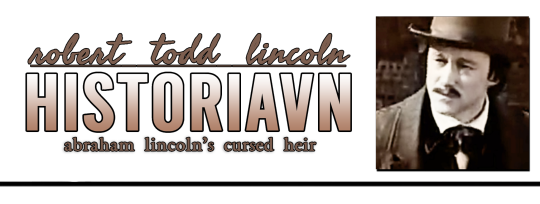
“I don’t …” He swallowed thickly, then continued to speak. “I don’t understand. You are a human being, and you have free will. How could exercising that free will ever be dangerous?”

#╭ ⁞ ❏. askbox replies.#╭ ⁞ ❏. written works.#╭ ⁞ ❏. narrations / robert todd lincoln.#frxncaise#✎ ; universe / timeline ── ❛ the prince of rails ❜ ── first son of the united states
2 notes
·
View notes
Photo
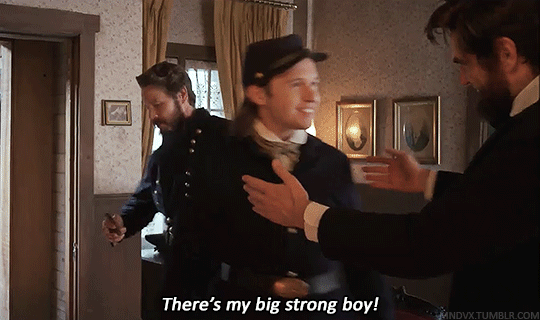
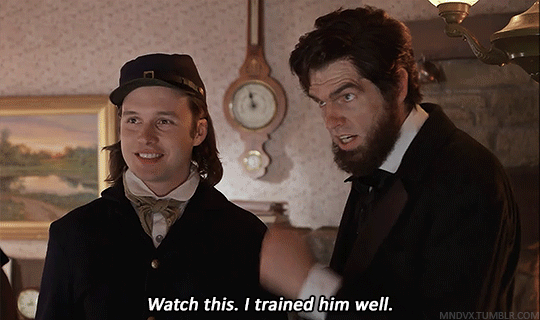

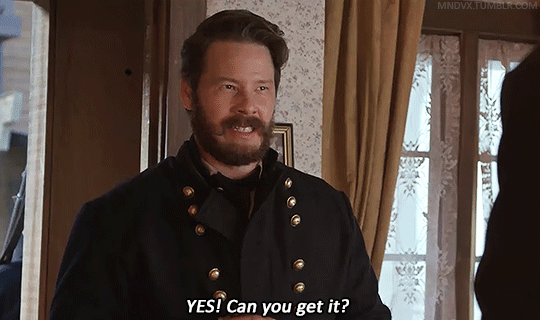
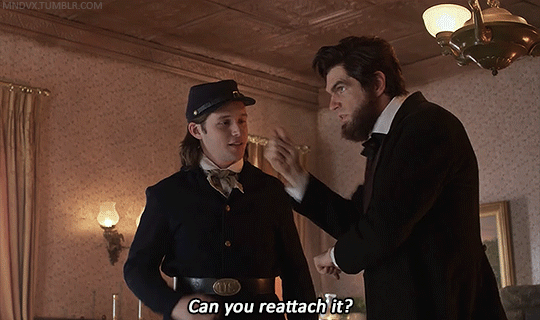

HISTORY OF THE WORLD, PART II – I (Episode 1)
››› Nick Robinson as Robert Todd Lincoln
››› Timothy Simons as Abraham Lincoln
››› Ike Barinholtz as Ulysses S. Grant
#nick robinson#nickrobinsonedit#tvedit#history of the world part 2#history of the world#timothy simons#ike barinholtz
105 notes
·
View notes